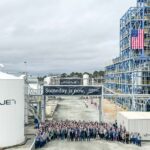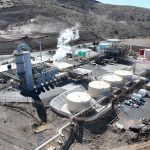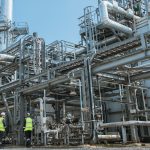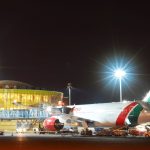Airbus, airline SAS, Swedish energy company Vattenfall and airport operators Avinor and Swedavia have signed a MoU to work together to develop infrastructure for hydrogen aviation in Sweden and Norway. The partners will undertake a feasibility study covering both countries and over 50 airports, and will develop a framework and review the conditions for a possible roll-out. The one-year study, with the possibility of an extension, will also look at scenarios for the potential number of hydrogen-powered aircraft movements and the volume of hydrogen required that would need to be stored at the airports. Hydrogen is a crucial component of the aviation sector’s energy transition but will require airports to adapt to new procedures linked to refuelling, safety and fire protection, as well as the handling of liquid hydrogen.
The framework will cover the entire chain, from production and transport to storage and hydrogen refuelling at commercial airports. By bringing together competencies that cover all aspects of aviation, the collaboration aims to create an overall picture of the conditions required to enable the transition to hydrogen-powered aviation, say the partners. The work will also identify the pathways to select which airports will be transformed first to operate hydrogen-powered aircraft in both countries, as well as the accompanying regulatory framework.
“Swedavia, Avinor and SAS have already established successful collaborations in fossil-free aviation, and it is therefore exciting that Airbus, with its extensive knowledge of hydrogen-powered aircraft through its ZEROe initiative, and Vattenfall, with its expertise in electricity and energy production, are joining us in a more in-depth collaboration,” said Swedavia CEO Jonas Abrahamsson.
“Hydrogen is expected to gradually become an increasing part of the aviation industry’s fuel mix in the future and will therefore have an increasing effect on the infrastructure and planning of our airports.”
The switch to hydrogen-powered aviation is a complex process, says the Swedish airport operator, and infrastructure will have to be adapted due to the need to store hydrogen and, potentially, to enable the production of hydrogen at, or in close proximity, to airports.
Norway, as well as Sweden, is well positioned to be an early mover in the introduction of hydrogen-powered aircraft, believes Avinor CEO Abraham Foss. “As the owner of 43 airports across Norway, Avinor has already been working on sustainability for many years and has taken a position to be a driving force and facilitator for the green transition of Norwegian aviation,” he said.
Commented Anna Borg, CEO of Vattenfall: “Aviation is a hard to abate industry where breaking away from fossil fuels is a huge challenge today. This cross-border collaboration, however, demonstrates the willingness to bring about change. We look forward to contributing our expertise in electricity market development, electrical infrastructure and hydrogen production in Sweden.”
Airbus unveiled its first ZEROe hydrogen-powered commercial aircraft in 2020, aiming to bring it to market by 2035. It also launched its Hydrogen Hub at Airports programme (see graphic below) to jumpstart research into infrastructure requirements and low-carbon airport operations. Airbus has already signed agreements with partners and airports in ten countries, including France, Germany, Italy, Japan, New Zealand, Norway, Singapore, South Korea, Sweden and the United Kingdom.
“Hydrogen stands out as a key enabler as we pioneer a sustainable aviation future,” said Guillaume Faury, Airbus CEO. “Norway and Sweden are among the most demanding regions for aviation and have great potential for hydrogen production from renewable energy sources. I am very pleased to enter into this cooperation with partners fully engaged to take significant steps towards decarbonising aerospace. It fits perfectly with our strategy of deploying hydrogen aviation ecosystems in the most suitable parts of the world.”
In January, Airbus opened a ZEROe Development Centre (ZEDC) at its Stade, Germany, site. The centre will accelerate the development of composite hydrogen system technologies for storing cryogenic liquid hydrogen, said Airbus. ZEDC Stade is part of a network of development centres for technologies to decarbonise the aerospace industry and complement other Airbus sites in Europe to get a hydrogen-powered aircraft in the sky by the middle of the next decade.

Top image (Airbus): Turboprop concept of ZEROe hydrogen-powered aircraft at the airport















More News & Features
European Commission announces Sustainable Transport Investment Plan to advance low-and-no-carbon fuels
New Danish measures emerge to reduce aviation’s air and ground emissions
Aviation and fuel industries call for urgent EU policy action on SAF deployment
ZeroAvia intensifies UK activity, as it progresses certification of zero emission powertrains
SkyNRG and ICF warn of “HEFA tipping point” as SAF feedstock demand soars
Heart Aerospace in surprise HQ move from Sweden to Los Angeles, citing bigger US opportunities